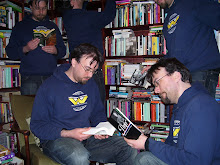In June, Faber is repackaging eight of their back catalogue under the heading 'Revolutionary Writing'. It seems a pretty broad and arbitrary name for what seems to be a random book from each of their top-selling writers. Here are the covers so far available (two more in the series--Rohinton Mistry's A Fine Balance and David Peace's GB84--don't yet have covers).
I quite like the Auster and James covers (though neither book is that great*), and the Foden and Kureishis anren't bad. Overall, though, these just don't seem revolutionary enough.
* James's The Children of Men is an excellent example of the Godfather syndrome: great books often make mediocre movies, but mediocre books can make for great films.
Subscribe to:
Post Comments (Atom)










10 comments:
I like the Auster cover the best-- but it took me a long time to figure out the lettering-- it was odd but original.
The cover for the Black Album is good, too.
i suppose within the violently abstracted field of literary fiction, these could qualify as revo-- no not even then haha!!
Yes, hard to think of Rohinton Mistry's A Fine Balance as revolutionary. Canadian revolutionary writing? The Favourite Game comes to mind first... A Fine Balance doesn't come to mind at all.
I like the Pamuk cover the best I think and although I love both A Fine Balance and The Black Album - I agree that none of these is really "revolutionary"....
My copy of The Children of Men from Vintage had a big sticker on it that said, "READ THE BOOK, THEN SEE THE MOVIE." I did both, and regretted doing the first. Good cover, though: http://tinyurl.com/263fb6l
Almost a shame that I gave it away. Almost.
I do like that Vintage cover. Mine is an older Faber with an empty hill on a sunny day, which is oddly effective too: http://tinyurl.com/27xqhxc
I like that one, too, simply because it's so dissonant considering the subject matter, but I don't think any of the covers I've seen have knocked it out of the park. Then again, if that happened, it would just be great talent wasted on a book that sucks.
You've got a really enjoyable
blog here! Thank you for it!
WFJ. X
I suppose the 'revolutionary' angle comes from the fact that (some of) the books deal with political upheaval or struggle as a subject matter: certainly Leviathan with its tale of a domestic terrorist does, as does The Feast of the Goat (assassination of a dictator), and A Fine Balance (set during the Indian 'Emergency').
That makes sense, and I can't believe I missed it. 'The Black Album' is about a young Muslim revolutionary in the UK, 'Children of Me' has its narrator involved in undermining his best friend, the PM, and 'Last King of Scotland' is very political, behind the scenes with Idi Amin.
Post a Comment